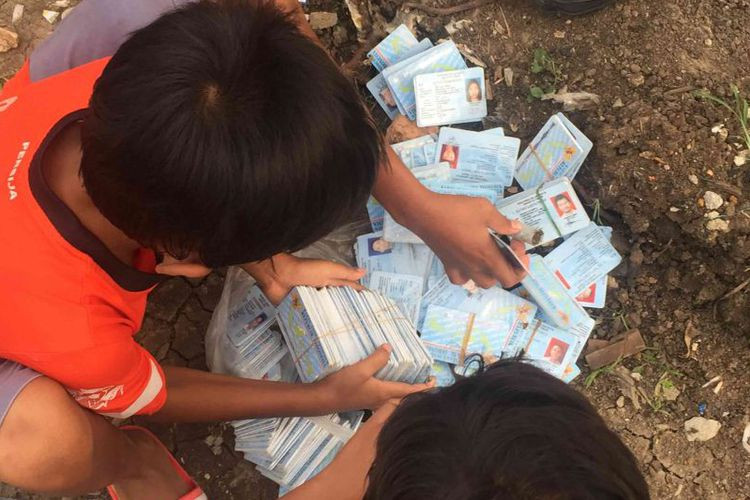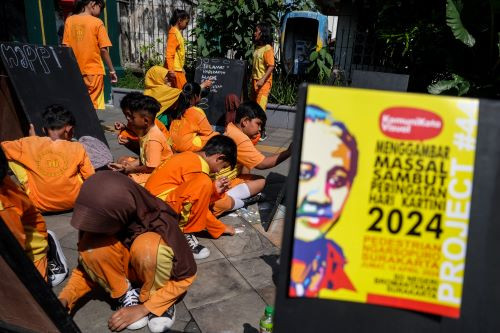Another e-ID card saga
The recent findings of thousands of discarded e-ID cards, deliberately or not, in several areas across the country should give us cause for concern.
Change Size
 Children hold e-ID cards that are found in a sack on a paddy field in Pondok Kopi, East Jakarta on Dec. 12, 2018. (kompas.com/David Oliver Purba)
Children hold e-ID cards that are found in a sack on a paddy field in Pondok Kopi, East Jakarta on Dec. 12, 2018. (kompas.com/David Oliver Purba)
T
he recent findings of thousands of discarded e-ID cards, deliberately or not, in several areas across the country should give us cause for concern. The incidents signal the country’s poor management of the population registry, on top of mega-corruption plaguing the procurement of e-ID cards.
To add insult to injury, a man was arrested on Monday for allegedly selling official blank e-ID cards. The police’s move only confirms suspicions that access to state documents for evil purposes, including criminal or perhaps terrorism-related motives, is available to all.
On Tuesday, the police detained the son of a former official of the Lampung Population and Registration Agency, identified only as NID, and will charge him under the Population Administration Law and the Electronic Information and Transactions Law for illegally selling the state documents. While the offense is deemed serious because of its wide-ranging implications, the police’s claim that the suspect offered 10 blank ID-cards for sale online just for fun is an unnecessary misjudgment.
In fact, there was a tendency to play down repeated reports of the findings of e-ID cards in bulk in unusual places on the part of law enforcers and the government. Similarly, there had been no sense of urgency to thoroughly investigate reports of people holding two or more e-ID cards.
Only after leading news daily Kompas published a series of investigative reports about the “original but fake” e-ID card business last week did the police and Home Ministry show their teeth. The investigative reports came to the conclusion that the information technology (IT) system of the national e-ID card had been hacked, as evident in the fact that the illegal e-ID cards passed security controls. Home Ministry officials, however, brushed aside the vulnerability of the IT system to cyberattacks.
The daily found that several kiosks in Pramuka market in East Jakarta operate the e-ID card business and apparently escaped the police’s radar. They also take orders for other documents like birth certificates and passports.
For sure, fake documents will facilitate crime like bank fraud and pose security threats as in the case of terrorists who easily find places to live and assemble bombs. Bogus documents have also been rampantly used in human trafficking.
Now that the elections are nearing, the issue of fake e-ID cards has emerged as a sensitive matter and will be potentially blown out of proportion if the government fails to address it sooner, rather than later.
For the sake of credible elections, there is no other choice for law enforcers but to launch a crackdown on those involved in the illegal e-ID card business. To ensure the validity of e-ID cards, the use of card readers should be an option. In the context of elections, card readers can minimize double, or triple, voting.
The General Elections Commission has registered eligible voters based on their unique population registration number, which is produced by the Home Ministry. Theoretically, no voter is registered more than once, but negligence will create loopholes.









